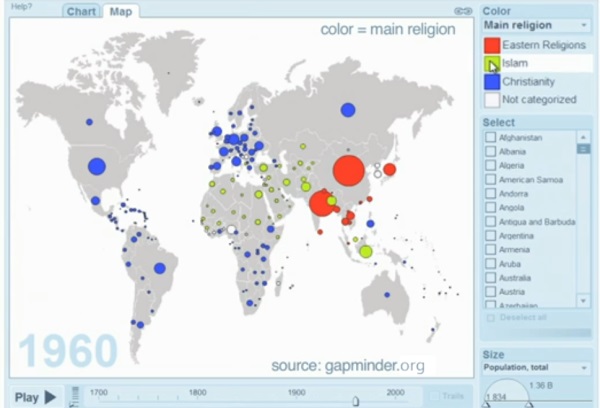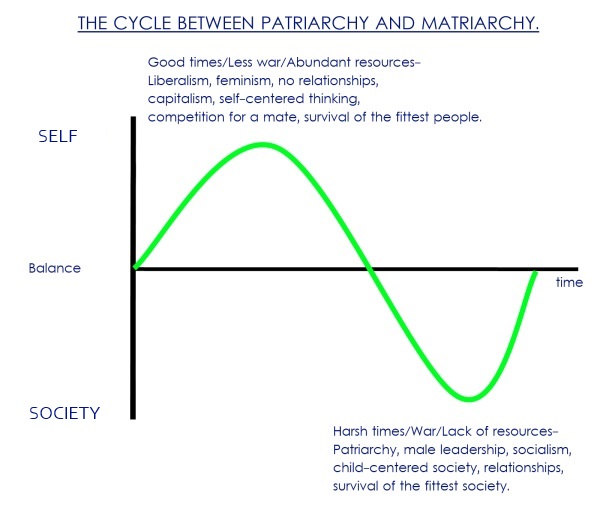Latest Supporter Submission:
We are in a transition from a traditional society (let’s call it the patriarchy) to a liberal-minded society (let’s call it a matriarchy). Men suffer quite a lot in this transition, because the laws are essentially all very patriarchal and women still expect things like child-support (something which would normally only exist in a patriarchy), while they behave as though they are in a matriarchy (wanting to sleep around and still be respected, etc.).
Now the patriarchy is actually not a society that favors men over women, and the matriarchy is not a society which favors women over men. Both societies favor men and women equally. I know a lot of MRAs do not believe this and use the draft as evidence that the patriarchy favored women more, but that is not true. The patriarchy is actually a society that favors children, while the matriarchy favors the individual (or self).
The patriarchy is a child-centered society. It is interested in birth and survival rates of children, and that is why males were drafted. Male disposability led to more children. The patriarchy comes from difficult times, it was born in hard times, it is a very social system, an efficient system, and it’s a survival mechanism.
We know it leads to successful societies because many of the major cultures that dominate the world today have a patriarchal history. And we can see this most clearly through the fact that the world’s major religions like Christianity, Islam, Hinduism and Confucianism all come from cultures which support the patriarchy. All of these religions and the cultures that support them speak of female obedience to her husband and male responsibility and dominance over to his family.
Most of the world’s major cultures have patriarchal roots, this is a map showing the major religions of each country as it was in 1960. It is taken from Hans Rosling’s talk on religion and babies.

Since people who share the same religion also often share common cultural practices with respect to structuring family life, and the cultures associated with the major religions in the picture above are all patriarchal, we can see that the patriarchal way of structuring society has had a lot of success.
The matriarchy–and I feel like I have lived in one, which is Jamaica–is a “matriarchal” society within a patriarchal setting. It is not a very social system, and is in fact very inefficient. It works when resources are abundant and easy to access and it works on the principal that everyone just does what is best for themselves. What happens in such a society is that men do not take care of or even know their kids. Women work and take all the steady, easy and good jobs. Men, who only need to take care of themselves, take the unstable and unreliable jobs, the hard jobs.
Men and women do not live together and do not seek to form relationships. They just come together for sex. Gender roles still exist, but male female interaction is more limited so they only exist pre-sex. Typically males compete for female attention and have to offer women something material in order to get sex. The thing is, though, in this system most women are attracted to the same men and those men get the most sex. Also, on a side-note, I think you have bit more bisexualism in this type of society. This is not a bad thing, but I think many women use it as a sort of birth control, they have sex with other women because they know it is safe and they cannot get pregnant.
Now I know a lot of people will disagree with me, but in part male/female relations are actually a trade with sex being the commodity. In any sexual act the person with the most at stake is the female. Putting aside unfair laws, child support actually came from the patriarchy. The woman is the one who might get pregnant when the act is over, she might end up with a child, while the man ends up with no consequence beyond sex. That sets things up so that men are always seeking sex from women.
Now essentially without science we can define women and men by saying women make babies and feed infants, and men do not make babies or feed infants, freeing them up to do other things with their time. This sets things up so that women are more limited than men with respect to their access to resources. So with men in need of sex and women in need of rare or hard to get resources, in both the patriarchy and the matriarchy, this trade takes place.
Marriage was a trade of sex (and access to one’s children) for male work (less limited work). In the matriarchy that same trade occurs (minus access to one’s children) but on a short term basis. The traditional system is a much more social system because it shares the sex and male work equally, while the matriarchal does not. I think the majority of people can actually benefit from the traditional system. There are some who will do better in the matriarchal system, but the majority does better in the patriarchy. So we need to maintain that balance and so we need to fight for the patriarchy to stay.
Humans are social beings. The social part of us causes most of us to follow the crowd and to fit into whatever we identify as the pattern (whether that pattern is to be weird, to be liberal, to be odd, or to fit in). The social part of our psychology causes society to trend either to traditionalism in an extreme form or to liberalism in an extreme form. We have to fight so that society does not end up on the extremely liberal side, so that we have balance.
The picture below shows how I think the cycle between the matriarchy and the patriarchy works, I do not mean to imply that any one society is fully matriarchal or fully patriarchal, because in fact I think there are layers from both sides in every society. The idea of a central government and taxes for example is a social system and it exists in many capitalist settings. I think society takes the parts from the self-centered society that it can, while using the parts of the society-centered society that are necessary.

What I do mean to imply is that many parts of the traditional way of structuring society are beneficial to the majority of society, and so I think we should hold on to them. The patriarchy has been successful for many reasons, and we have to be careful not to ignore some of these reasons. Male investment and access to their offspring both in the form of being a role model who would love, guide, and seek the best interests of their children and through their economic contributions benefited society enormously. Allowing women the freedom to focus on producing and caring for children also benefited society.
The patriarchy as we know it was not perfect, but neither is a matriarchy, and so I think we as a society need to start sifting through both systems, and it is important that as we do this we keep the parts of the patriarchal ways of structuring society that were, and can still be, beneficial to individuals and society.
This article was written by the Secular Traditionalist.

Agree
Other then the biological fallacies in your article the biggest of all of them is thinking that humans will function in the future in a patriarchy or matriacy system what is going to happen is the male will completely dominate civilization by taking reproduction with technology as we can already see the males are actively developing ectogenesis. What will happen is the males will not invest in the female of the species when they can bypass them to reproduction feminism was the dumbest thing women ever did not only will it destory civilization but also women’s social and reproductive value.
The scenarios in your article drive from the ways in which human societies have conducted themselves in the last 300 years or so, in a very civilisation-centric manner. If you study the vast myriad of ways that humans have settled things amongst themselves all around the world in many different times, more scenarios emerge.
For instance, in many native communities (not only people living in the Amazon basin, but for instance many people living in the countryside in small communities all around the world) there are extended families instead of the at-the-moment normative nuclear family arrangement. Instead of the child/children having a mom and/or a dad, they may have several biological or non-biological caretakers, from the biological parents’ and their families all the way to friends and neighbours and other responsible, involved adults. It has been studied that more committed, responsible adults a child has in their life, the better chances they have of feeling safe, cared for and their worries and questions addressed. Also the more adults are committed to offering their time and effort into the direction of caring for the child’s needs, the less of a burden it is per adult.
So in your point of view I see that you present two bad options of which “patriarchy” appears to be the better option. But if we actually start to consider all the possibilities of family organising, it becomes all the less imminent that this would be the best choice, from the child’s and the parents’ perspective.
Also I would suggest that you get more familiar with the words “patriarchy” and “matriarchy”, since their core meaning as understood by most people is quite different from the way you use them.
This is an extremely very biased article on why patriarchy trumps “matriarchy” (although, modern society isn’t a matriarchy… Yet.) Nothing to do with the pros and cons of either – which isn’t g